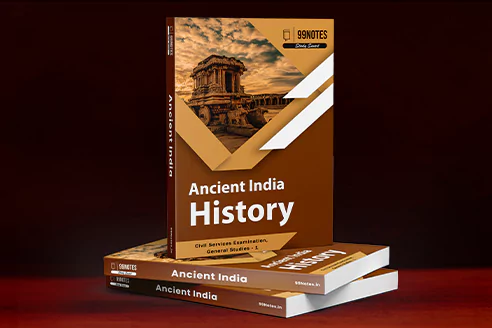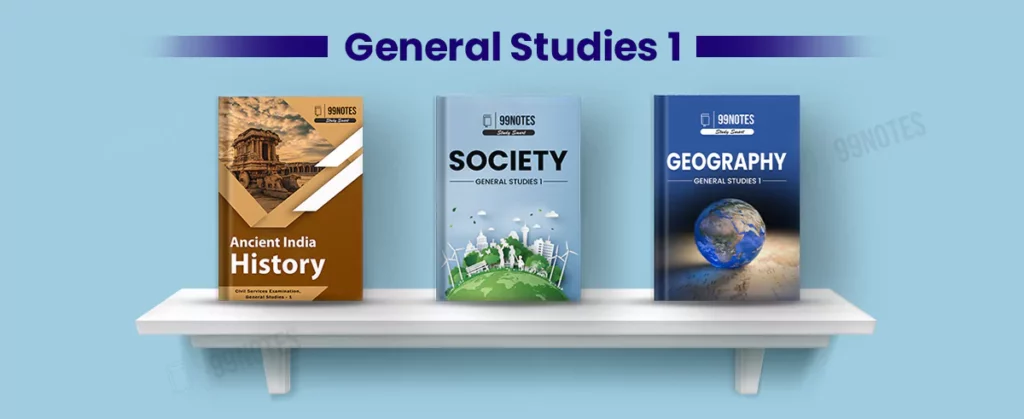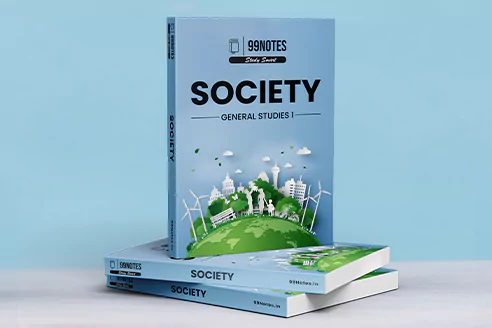General Studies 1 Complete Syllabus & GS 1 Notes Download


The study of History is important for both Mains and Prelims. It covers Ancient and Medieval India with a particular emphasis on Indian heritage and culture. The study of modern India covers British India and India’s struggle for Independence. Indian Art and culture cover a wide range of topics apart from History.

Society
The study of Society is vital for Mains’s perspective specifically. The syllabus of Indian Society is quite broad and has a fluid structure. Therefore, particular focus should be given to note compilation.

Geography
The syllabus of Geography includes features of the world’s physical geography, Key natural resources and the factors responsible for the location of industries in various parts of the world, including India.

UPSC GS 1 Syllabus
GS 1 Syllabus
The General Studies (GS) 1 paper of the UPSC Civil Services Examination (CSE) covers the subjects of Indian Heritage and Culture, History, and Geography. It aims to test the candidate’s knowledge of India’s cultural and physical diversity, as well as its history and geographical features.
Here are some tips on how to prepare for the GS 1 paper in detail:
- To prepare for this section of the GS 1 paper, you should study the major events and movements that have shaped India’s history, as well as the major themes and issues in Indian history. Some key topics to cover include:
- The ancient and medieval periods of Indian history, including the Indus Valley Civilization, the Mauryan and Gupta empires, and the Mughal Empire
- The British colonial period and the independence movement
- The partition of India and the emergence of modern India
- The major social, cultural, and political developments in India, such as the impact of colonialism, the emergence of democratic institutions, and the development of a federal system of government
- The major issues and challenges facing India today, such as poverty, inequality, and communalism
- Indian Heritage and Culture: To prepare for this section of the GS 1 paper, you should familiarize yourself with the major cultural traditions, religions, languages, and art forms of India.
This includes studying the ancient and modern history of India, as well as its cultural diversity. Some key topics to cover include:
- The Indus Valley Civilization and ancient India
- The Mauryan and Gupta empires
- The Mughal Empire and its impact on Indian culture
- The British colonial period and the independence movement
- The cultural, linguistic, and religious diversity of India
- The major art forms and cultural traditions of India, such as literature, music, dance, and cinema.
GEOGRAPHY
HISTORY
- To prepare for this section of the GS 1 paper, you should study the major physical and geographical features of India, as well as its climate and natural resources. Some key topics to cover include:
- The physical features of India, such as the mountains, rivers, and plateaus
- The climate of India, including the monsoon system and the major climatic regions
- The natural resources of India, such as minerals, forests, and water
- The major agricultural and industrial regions of India
- The major environmental and biodiversity issues facing India, such as pollution, deforestation, and climate change
Analyzing and interpreting historical and cultural information: In the GS 1 paper, you will be expected to not only recall facts and information, but also to analyze and interpret them. This involves examining the context and significance of historical and cultural events and developments, and being able to draw connections and conclusions from them.
To prepare for this, you should practice analyzing and interpreting information by:
- Examining the causes and consequences of historical and cultural events and developments
- Evaluating the impact of these events and developments on society and culture
- Drawing connections between different events and developments, and analyzing their interrelationships
- Synthesizing information from multiple sources to form a coherent and well-supported argument
Practice answering sample questions and take mock tests:
To improve your test-taking skills, you should practice answering sample questions and take mock tests. This will help you understand the types of questions that are asked in the GS 1 paper and improve your time management skills. You can find sample questions and mock tests online or in study guides for the CSE.
Overall, to prepare for the GS 1 paper of the CSE, you should follow a structured study plan and cover all the topics in each subject.
Many questions in the GS 1 paper are based on recent events and developments, so it is important to stay updated on current affairs. You should regularly read newspapers, magazines, and online news sources to stay informed about the latest developments in Indian history, culture, and geography. You should also pay attention to national and international news.
You should also practice answering sample questions and take mock tests, and stay updated on current affairs. By following these tips, you can develop a strong foundation of knowledge and skills in Indian heritage, culture, history, and geography, and be well-prepared for the GS 1 paper of the CSE.
Related Links:
GS 1 UPSC: Your Ultimate Guide
Preparing for the UPSC exam can be daunting, especially when tackling the vast syllabus of General Studies 1 (GS 1). This guide is designed to provide you with comprehensive GS 1 notes for UPSC, helping you ace one of the most challenging components of the exam.
What is GS 1 in UPSC?
General Studies 1 (GS 1) is a crucial part of the UPSC Civil Services Examination, covering a wide array of subjects including Indian Heritage and Culture, History, and Geography of the World and Society. Understanding the depth and breadth of GS 1 UPSC is essential for scoring well.
Key Topics Covered in GS 1 UPSC
- Indian Heritage and Culture: Dive into the rich tapestry of India’s cultural heritage, exploring art forms, literature, and architecture from ancient to modern times.
- History: Study the historical events that shaped India and the world. This includes Modern Indian History, the Freedom Struggle, and Post-Independence consolidation.
- Geography: Learn about the physical, social, and economic geography of India and the world, focusing on important geographical phenomena and their impact.
Why GS 1 Notes for UPSC are Crucial
Having well-organized GS 1 notes for UPSC can make your preparation more efficient. These notes help in quick revisions, better retention, and understanding of key concepts. They are indispensable tools for cracking the exam.
How to Prepare Effective GS 1 Notes for UPSC
- Systematic Study: Break down the syllabus into manageable sections. Focus on understanding each topic thoroughly before moving on to the next.
- Current Affairs Integration: Connect historical and geographical concepts with current events to make your notes more relevant.
- Use of Diagrams and Maps: Visual aids can enhance your understanding and recall of complex topics.
Free Study Material on GS 1 UPSC from 99Notes
Access free study material on GS 1 UPSC from 99Notes, offering detailed explanations and insights into all major topics. These resources are curated to help you streamline your preparation and achieve success.
Recommended Resources for GS 1 UPSC
- 99Notes Website: The topmost free resource for UPSC aspirants, providing high-quality GS 1 notes and study materials.
- NCERT Books: Start with NCERT textbooks for a strong foundation.
- Books on GS 1 Notes UPSC: Use books by renowned authors like Bipin Chandra for history and Majid Husain for geography.
- Online Resources: Websites like PIB, Yojana, and Kurukshetra provide valuable insights and updates.
Tips for Success in GS 1 UPSC
- Consistent Revision: Regularly revise your GS 1 notes to keep the information fresh in your mind.
- Practice Writing: Answer writing practice is crucial. It helps in framing well-structured answers in the exam.
- Mock Tests: Participate in mock tests to assess your preparation and identify areas that need improvement.
By following these strategies and utilizing comprehensive GS 1 notes for UPSC, you can enhance your preparation and boost your confidence. Remember, consistent effort and a strategic approach are key to mastering General Studies 1 UPSC.
Stay focused, stay motivated, and success in UPSC is within your reach!
A Guide to Getting Started with UPSC CSE 2024
- Understand the Eligibility Criteria: Before you start your UPSC CSE 2024 journey, it is important to understand the eligibility criteria. The eligibility criteria for UPSC CSE 2024 is that you must be a citizen of India, you must be at least 21 years old and you must have a Bachelor’s degree or equivalent qualification from a recognized university.
- Get Familiar with the Syllabus: The syllabus for the UPSC CSE 2024 exam is vast and diverse. It covers topics from all the major subjects such as General Studies, Current Affairs, History, Geography, Economics, Political Science, Public Administration, Law, and more. You can find the detailed syllabus on the UPSC website.
- Start Preparing Early: It is important to start your preparation for UPSC CSE 2024 as early as possible. This will give you enough time to cover all the topics in the syllabus and to practice as much as possible.
- Prepare a Study Plan: It is important to have a well-structured study plan. This plan should include topics to cover, time to dedicate to each topic, and a timeline to complete the syllabus.
- Use Mock Tests: To get an idea of the exam pattern and to practice for the UPSC CSE 2024 exam, it is important to take mock tests. There are many online and offline resources available that can help you practice for the exam.
- Stay Up to Date with Current Affairs: Current affairs are an important part of the UPSC CSE 2024 exam. It is important to stay up to date with the latest news and developments in the world.
- Take Adequate Rest: It is important to take adequate rest and maintain a healthy lifestyle during the preparation period. This will help you stay focused and energized during the exam.
- Clear Your Doubts: If you have any doubts or questions related to the UPSC CSE 2024 exam, it is important to clear them as soon as possible. You can do this by asking your teachers, friends, or taking help from online forums.






